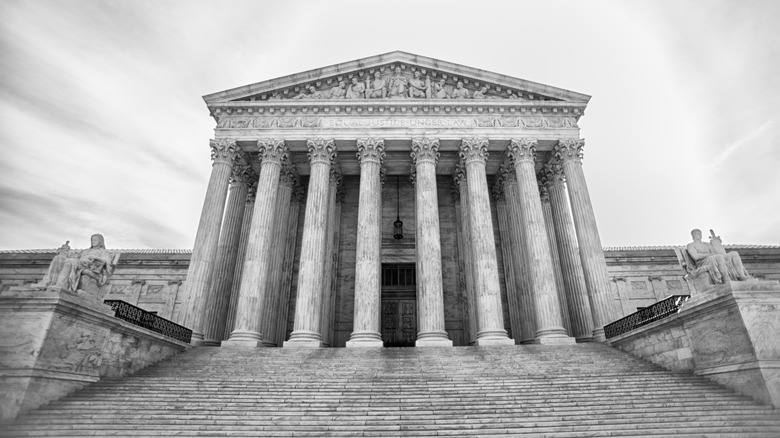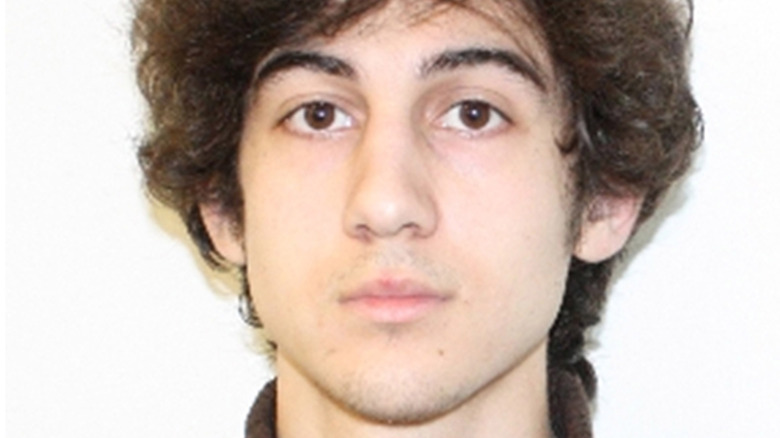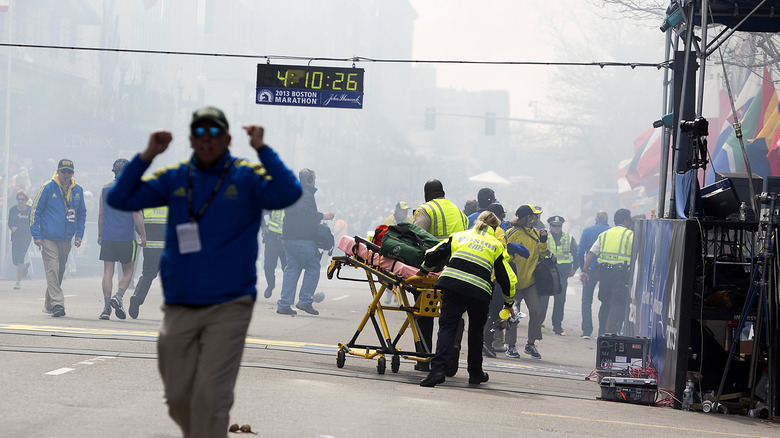What The Supreme Court Justices Believe About Dzhokhar Tsarnaev's Death Sentence
A years-long legal battle over the death sentence handed to Boston Marathon bomber Dzhokhar Tsarnaev came to end on April 21, when the United States Supreme Court announced its decision to reinstate the death penalty. According to ABC News, Tsarnaev had been sentenced to death after a jury unanimously decided it was the right punishment for his part in the 2013 attack that left three dead and hundreds injured, as well as the murder of an MIT police officer while he and his deceased brother, Tamerlin Tsarnaev, attempted to evade capture.
However, Tsarnaev appealed the ruling and it was overturned by a federal judge. The basis of Tsarnaev's appeal had been that he had not received a fair trial, something guaranteed under the Sixth Amendment of the United States Constitution (via Cornell Law School). The 1st U.S. Circuit Court of Appeals' decision to overturn the death sentence stemmed from the belief that the judge in Tsarnaev's original criminal trial had not properly questioned the jurors in regard to the immense publicity associated with the case. They also argued that the original judge was wrong in withholding evidence from the jury pertaining to an alleged murder committed by Tamerlan Tsarnaev in 2011, a piece of information that would have potentially helped Dzhokhar Tsarnaev's defense that his older brother had been entirely responsible for their radicalization.
How the case wound up before the Supreme Court
Dzhokhar Tsarnaev was found guilty on all 30 counts he was indicted on, including 17 capital offenses. His legal team argued that the trial judge should have, but did not, ask jurors about their media consumption ahead of their selection, as the case had received extensive coverage over the years. They were also of the belief that jurors should have been aware of the evidence linking Dzhokhar's brother, Tamerlan, to a 2011 murder (via the Supreme Court). Following the 1st U.S. Circuit Court of Appeals' decision to do away with Dzhokhar Tsarnaev's death sentence, the United States Justice Department brought the case to the Court's attention, asking that the death sentence be reinstated (via ABC News).
What was somewhat unusual about this was that just a few months before introducing Tsarnaev's case to the Supreme Court, United States Attorney General Merrick Garland announced that the department was pausing the execution of federal inmates. According to the Death Penalty Information Center, this was so that the department could evaluate issues that have been alleged concerning the death penalty and its implementation, including racial bias and wrongful convictions. Likewise, President Joe Biden has also stated his hopes to do away with the death penalty altogether, which, according to ABC News, makes him the first sitting president to hold that view.
The Supreme Court ruled 6-3 in favor of reinstating Tsarnaev's death sentence
The Supreme Court announced its 6-3 ruling in the case on March 4, with the court's six conservative justices in favor of reinstating the death sentence, while the three liberal justices on the court offered the dissenting opinion. According to another report by ABC News, Justice Clarence Thomas wrote the opinion, in which he said, "Dzhokhar Tsarnaev committed heinous crimes. The Sixth Amendment nonetheless guaranteed him a fair trial before an impartial jury. He received one." This expressed the Court's prevailing opinion that despite his defense team's arguments to the contrary, Tsarnaev had received a fair trial.
The three justices who were opposed to reinstating Tsarnaev's death sentences — Justices Breyer, Kagan, and Sotomayor — felt that Tsarnaev should have been permitted to introduce evidence about his brother's alleged involvement in the 2011 murder. "Dzhokhar conceded his guilt. The only issue was whether he deserved to die," wrote Justice Breyer, who penned the dissenting opinion. "Tellingly, the jury's nuanced verdict reflected close attention to the relationship between the brothers ... And it would have taken only one juror's change of mind to have produced a sentence other than death, even if a severe one." It is unknown if and when Tsarnaev's execution will be carried out, given the Justice Department's current pause on the death penalty (via Death Penalty Information Center).


